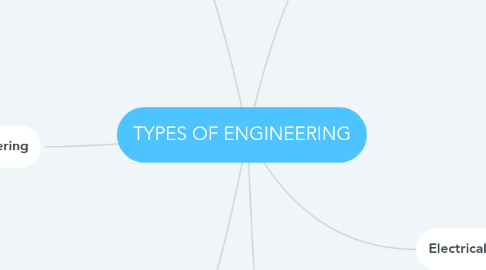
1. Software Engineering
1.1. What is it?
1.1.1. It encompasses concepts, principles, theories, techniques and tools that can be used for developing high-quality professional software.
1.2. What does a Software Engineer do?
1.2.1. They analyze first the needs of the user.
1.2.2. They design, construct, test, and maintain computer applications software or systems to meet these needs.
1.3. Areas of expertise.
1.3.1. Computers.
1.3.2. Programming.
1.3.3. Software.
1.3.4. Code programs.
1.3.5. Intranet systems.
2. Chemical Engineering
2.1. What is it?
2.1.1. It is the application of chemistry to the process of converting either raw materials or chemical substances into more useful or valuable forms.
2.2. What does a Chemical Engineer do?
2.2.1. They design, install, construct and operate plants and equipments for manufacturing chemical products.
2.3. Areas of expertise.
2.3.1. Pharmaceutical.
2.3.2. Energy.
2.3.3. Biotechnology.
2.3.4. Processes as:
2.3.4.1. Crystallization.
2.3.4.2. Dissolution.
2.3.4.3. Distillation.
2.3.4.4. Filtration.
2.3.4.5. Polymerization.
2.3.4.6. Solvent extraction.
3. Mechanical Engineering
3.1. What is it?
3.1.1. It applies principles as:
3.1.1.1. physics and materials science for the:
3.1.1.1.1. analysis, design, manufacturing, and maintenance of mechanical systems.
3.2. What does a Mechanical Engineer do?
3.2.1. They are involved with the generation, distribution, and use of energy; the processing of materials; the control and automation of manufacturing systems; the design and development of machines; and the solutions to environmental problems.
3.3. Areas of expertise.
3.3.1. Design and control of a system.
3.3.2. Feasibility and efficiency of a system.
3.3.3. Quality management.
3.3.4. Improvement process.
3.3.5. Machinery and product.
4. What is it?
4.1. It involves the development, design, application, and manufacture of systems and devices that generate and use electric power and electric signals.
5. Industrial Engineering
5.1. What is it?
5.1.1. It concerns with the analysis, design, and control of production, service, and distribution systems.
5.2. What does a Industrial Engineer do?
5.2.1. Use computer simulation for system analysis and evaluation.
5.2.2. Seek to eliminate waste of time, money, materials, energy, etc.
5.2.3. Develope management control systems to assist in:
5.2.3.1. Financial planning.
5.2.3.2. Cost analysis.
5.2.3.3. Production planning.
5.2.3.4. Physical distribution of goods and services.
5.3. Areas of expertise.
5.3.1. Facility layout and design.
5.3.2. Machinery and equipment.
5.3.3. Materials and components.
5.3.4. Human resources.
5.3.5. Optimization.
5.3.6. Logistics.
5.3.7. Management.
5.3.8. Safety procedures.
5.3.9. Ergonomics.
6. Electrical Engineering
6.1. What does a Electrical Engineer do?
6.1.1. They deal with power generation and transmission systems.
6.2. Areas of expertise.
6.2.1. Electric power.
6.2.2. Transferring information.
6.2.3. Communications systems.
6.2.4. Computer hardware.
6.2.5. Electronics.
